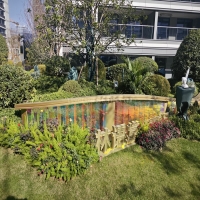Welcome to the website for landscape facilities products and knowledge.
What are the expected lifespans of different material types used in landscape round trash cans?
When selecting round trash cans for landscapes, understanding the lifespan of various materials is crucial for long-term durability and cost-effectiveness. Here’s a breakdown of common materials and their expected lifespans:
1. Plastic (Polyethylene/Resin):
- Lifespan: 5–10 years
- Pros: Lightweight, affordable, rust-proof.
- Cons: Prone to fading and cracking in extreme weather.
2. Stainless Steel:
- Lifespan: 15–20+ years
- Pros: Highly durable, resistant to corrosion, sleek appearance.
- Cons: Expensive, can dent if low-grade.
3. Galvanized Steel:
- Lifespan: 10–15 years
- Pros: Rust-resistant, sturdy, budget-friendly.
- Cons: May chip or scratch over time.
4. Concrete:
- Lifespan: 20+ years
- Pros: Extremely durable, vandal-resistant.
- Cons: Heavy, difficult to relocate.
5. Wood (Treated):
- Lifespan: 7–12 years
- Pros: Aesthetic appeal, blends with nature.
- Cons: Requires maintenance, susceptible to rot.
Factors Affecting Lifespan:
- Climate: UV exposure and temperature fluctuations shorten plastic lifespans.
- Usage: High-traffic areas may accelerate wear.
- Maintenance: Regular cleaning and coatings (e.g., for metal) extend durability.
For optimal longevity, choose stainless steel or galvanized steel in harsh climates, while plastic suits budget-conscious, low-impact settings. Concrete is ideal for permanent installations, and wood works best in sheltered, decorative spaces.
Related search:

Recommendation
Metal and acrylic color-changing combined curtain wall for large-scale public landscape facilities